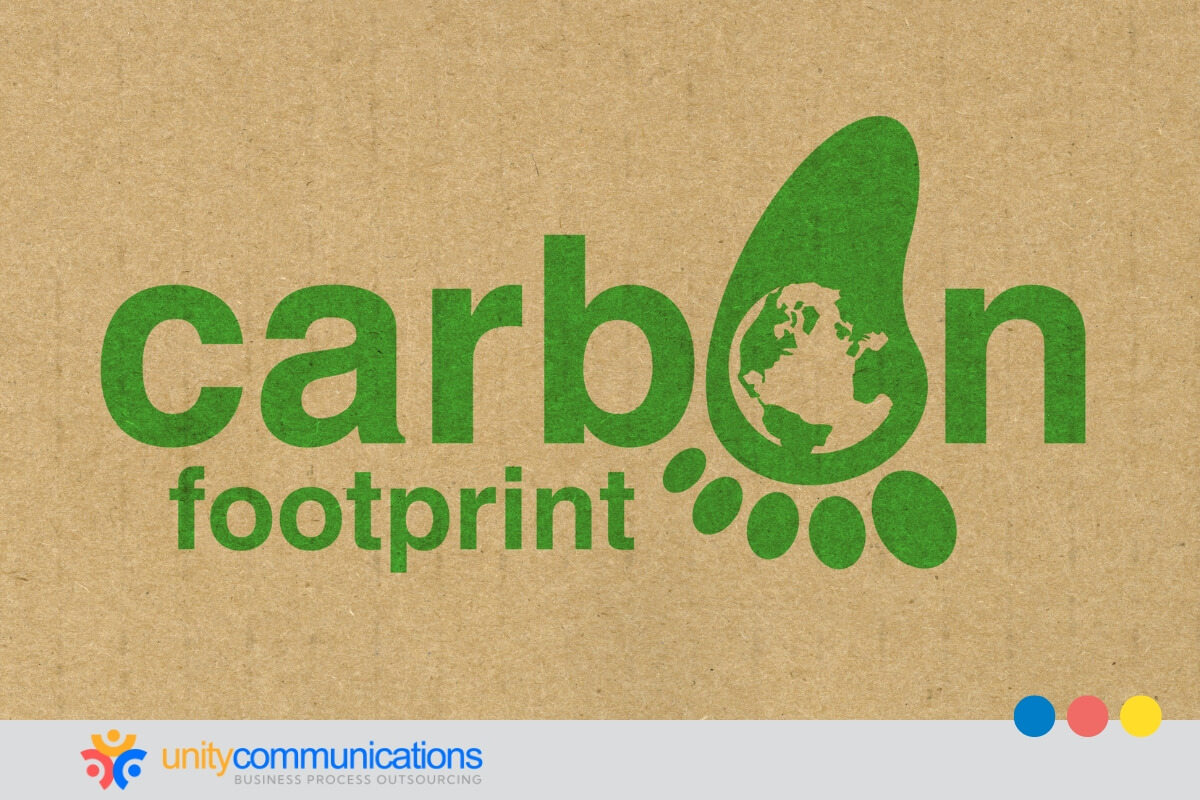Table of Contents
Can business process outsourcing (BPO) cut costs, boost efficiency, and be sustainable? The answer is yes, with green outsourcing.
Sustainability-focused BPO providers use renewable energy, reduce waste, and follow ethical practices. By partnering with them, your business will reduce its environmental footprint, enhance its brand reputation, appeal to eco-conscious customers, and drive long-term cost savings.
This article explores eco-friendly outsourcing practices—how they work, why they matter, and how you can adopt them to boost environmental impact and performance. Let’s dive in.
What is green outsourcing and why does it matter?

Green outsourcing reimagines traditional BPO by aligning cost-saving and efficiency goals with environmental responsibility. What is BPO, and how does it become green? Business process outsourcing is assigning tasks to service providers to decrease workload and pressure from the internal team, boost productivity, and scale the business faster.
Most companies also outsource to access specialized expertise they lack and reduce operating and labor expenses by hiring workers on demand or tapping talent from cost-effective countries.
Despite these benefits, traditional outsourcing contributes to climate change. Because most BPO operations are remote, they rely on energy-hungry data centers and constant digital connectivity, increasing their carbon footprint.
As consumers’ demand for sustainable business practices grows, BPO companies must rethink their commitment and evolve. The solution: green outsourcing—an approach that prioritizes environmental and social responsibility alongside performance.
Green outsourcing explained: Beyond cost-cutting to climate action
Also known as eco-friendly outsourcing, green outsourcing goes beyond cutting costs. This business model is about working with partners that prioritize sustainability without compromising performance.
Among the most impactful eco-friendly outsourcing practices are cloud migration, energy-efficient infrastructure, and paperless workflows, which help reduce the environmental load of traditional BPO models. They also cover fair wages, safe working conditions, and employee wellness programs.
With green outsourcing, sustainability transforms from a mere talking point to a critical business strategy, supporting innovation, resilience, and growth. Integrating it into your business positions your brand as a forward-thinking leader committed to long-term value and environmental responsibility.
Key benefits of green outsourcing practices

Amid the higher cost of living, one industry report shares that consumers are willing to spend nearly 10% more on sustainable products and services. This growing demand for environmentally responsible choices highlights the importance and benefits of green outsourcing for consumers and the planet.
Reduced carbon footprint
- Partnering with BPO providers that use renewable energy (e.g., solar, wind) reduces reliance on fossil fuels.
- Transitioning to cloud-based solutions lowers the need for physical servers and on-site infrastructure.
- Implementing energy-efficient technologies, such as LED lighting and smart building systems, reduces power consumption.
These initiatives reduce your environmental impact and strengthen your business for the long haul. They help you stay competitive, meet growing consumer expectations, and operate more efficiently in a changing world.
Minimized waste generation
- Digital documents reduce paper waste and printing costs.
- E-waste management recycles and responsibly disposes of outdated hardware.
- Using recycled and biodegradable office supplies and packaging reduces landfill contributions.
These waste-reduction efforts cut costs, free up resources, and support cleaner, more responsible operations. Together, they show how simple changes in daily practices can lead to measurable environmental and business gains.
Efficient resource utilization
- Water-saving technologies (e.g., low-flow fixtures) decrease water consumption in the workplace.
- Optimized supply chain and logistics management reduce fuel use and transportation emissions.
- Smart office designs with natural lighting and ventilation lower energy demand and improve working conditions.
These strategies maximize every resource—water, energy, and time—while improving day-to-day operations. By using less and working smarter, businesses can cut costs and shrink their environmental impact without sacrificing performance.
Support for the circular economy
- Encouraging outsourcing partners to recycle materials and refurbish equipment reduces the need for new resources.
- Extending a product’s life through repair and reuse minimizes environmental strain.
- Closed-loop manufacturing systems help decrease waste and maximize resource efficiency.
Embracing circular economy principles helps conserve resources and reduce waste throughout the supply chain. By prioritizing reuse, repair, and recycling, businesses create lasting value while protecting the environment.
These environmental wins reflect the growing effectiveness of eco-friendly outsourcing practices by sustainability-focused providers across the globe.
Economic advantages of adopting green outsourcing strategies
Working with environment-friendly BPO vendors is good for the environment and the bottom line. It lowers operating costs, improves market positioning, and unlocks new revenue opportunities.
The following further explains the economic benefits of green outsourcing:
Reduced operating costs
- Using energy-efficient systems reduces electricity and maintenance expenses.
- Partnering with local or regional BPO providers cuts transportation emissions and the shipping costs of long-distance logistics.
- Waste reduction initiatives minimize disposal fees and raw material expenses.
Choosing green outsourcing partners benefits the planet and drives real savings and business growth. By cutting costs and enhancing your market position, sustainable practices create a strong foundation for long-term success.
Enhanced brand reputation and customer loyalty
- Consumers prefer brands that demonstrate environmental responsibility.
- Strong sustainability credentials differentiate a business from competitors.
- Positive brand perception increases customer trust and repeat business.
Building a strong reputation for sustainability sets your brand apart in a crowded market. This trust attracts eco-conscious customers and encourages their loyalty and ongoing support.
Increased investor interest
- More investors prioritize companies with solid environmental, social, and governance (ESG) performance.
- Stakeholders perceive sustainable business practices as lower risk and more future-proof.
- Access to ESG-focused funding and green bonds becomes easier.
Strong ESG performance attracts investors who seek sustainable, lower-risk opportunities. This opens doors to specialized funding and green financing, helping your business grow responsibly and confidently.
Improved compliance and risk mitigation
- Meeting environmental regulations avoids fines and penalties.
- Proactive compliance with sustainability standards reduces legal and operational risks.
- Stable supply chains through responsible sourcing mitigate disruptions.
Staying ahead of environmental regulations helps your business avoid costly fines and legal issues. Proactive compliance and responsible sourcing also strengthen supply chain stability, reducing the risk of disruptions.
Sustained innovation and market expansion
- Green outsourcing encourages the development of new, sustainable products and services.
- Expanding into eco-conscious markets increases market share.
- Collaboration with green partners drives innovation and competitive advantage.
Green outsourcing sparks innovation by inspiring the creation of sustainable products and services. This approach helps capture eco-conscious markets and strengthens your competitive edge through valuable partnerships.
The eco-friendly outsourcing practices explored throughout this section show how operational savings and brand equity can grow alongside environmental impact reduction.
How to choose the right sustainable outsourcing partner

Selecting the right BPO partner is essential for building a successful green strategy. They can align with your sustainability goals and corporate ethos, increasing operational efficiency, brand credibility, and long-term business value.
Evaluating potential service providers requires analyzing their cost-effectiveness, performance, and environmental and social practices, especially in:
- Renewable energy use. Seek partners that power their facilities with solar, wind, or other renewable sources. Prioritize those using energy-efficient data centers and office spaces.
- Waste management and reduction. Determine whether the potential partner follows proper e-waste recycling practices and develops initiatives such as paperless workflows and reduced plastic usage.
- Transparent supply chains. Know how the partner finds materials and manages its supply chain. As 71% of consumers will pay more for transparent brands, favor partners that voluntarily disclose their sourcing approaches and environmental impact.
- Certifications and compliance. Choose those with industry certifications such as ISO 14001 (environmental management systems) and leadership in energy and environmental design (LEED). Ensure the partner complies with local and international environmental regulations.
- Social responsibility. Examine their labor practices, including their policies on fair wages and safe working conditions. Pick a BPO company that supports diversity, inclusion, and employee well-being.
Choosing a partner that truly embraces sustainability ensures your green strategy delivers lasting impact and business value. By carefully evaluating their environmental practices, transparency, and social responsibility, you set the foundation for a successful, ethical partnership.
Look for signs that the eco-friendly outsourcing practices explored in this section are already embedded in the provider’s operations.
Overcoming challenges in green outsourcing
Although eco-friendly outsourcing offers significant benefits, transitioning to sustainable practices has its share of risks and limitations. With the right approach, you can address these BPO challenges and establish a more sustainable and profitable partnership.
Here are common barriers to green outsourcing and how to tackle them:
1. Higher initial costs
Sustainable materials and renewable energy sources often cost a premium. Green certifications and eco-friendly infrastructure require a significant upfront investment.
Negotiate long-term contracts to lock in better rates and secure provider commitment. Tap into government incentives and grants where available. Most importantly, focus on the long-term return on investment from lower energy costs, operational efficiency, and enhanced brand equity.
2. Limited availability of green providers
Eco-friendly BPO companies might be scarce in certain regions due to limited access to renewable energy, higher costs of sustainable infrastructure, and fewer environmental regulations driving demand. Smaller providers might lack the resources to meet sustainability standards.
Partner with industry groups to increase demand for sustainable outsourcing. Encourage existing BPO companies to adopt greener practices and consider hybrid work a viable solution.
3. Operational disruptions
Transitioning to green outsourcing can disrupt existing workflows, while integrating new technologies and processes might require staff retraining.
Transition to more sustainable outsourcing practices in phases to minimize work interruptions. Provide training and resources to help employees adapt to new systems quickly. Work closely with BPO partners to align sustainability goals with business objectives.
4. Metrics and reporting impact
Tracking carbon emissions, energy use, and waste reduction can be complex. It requires accurate data collection across multiple systems, consistent key performance indicators (KPIs), and cross-border collaboration.
Establish clear metrics for environmental impact. Use established frameworks, such as the Global Reporting Initiative (GRI), for consistency, and partner with outsourcing providers to collect accurate and transparent data.
5. Cultural and regulatory misalignment
When outsourcing across borders, environmental priorities and regulations can vary widely. A BPO partner in one country might not face the same legal pressures or share your organization’s cultural values around sustainability. This disconnect can lead to miscommunication, inconsistent practices, and missed sustainability targets.
Conduct thorough due diligence to assess a provider’s environmental standards and regulatory compliance. Incorporate sustainability clauses in your service-level agreements (SLAs) and maintain ongoing dialogue to align expectations. Leverage third-party audits to ensure transparency and accountability across regions.
The bottom line
Green outsourcing allows companies to align environmental goals with operational success. As the eco-friendly outsourcing practices explored in this article demonstrate, harmonizing profitability with sustainability is the new standard for competitive, responsible business. The techniques help you comply with evolving environmental regulations and drive long-term efficiency.
If you’re ready to explore how green outsourcing can benefit your business, let’s connect today.




